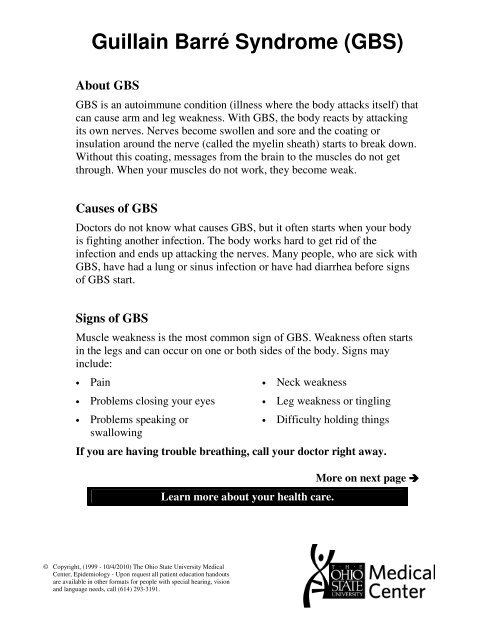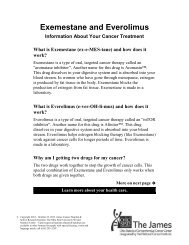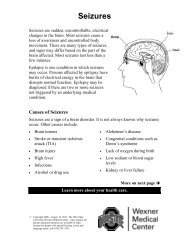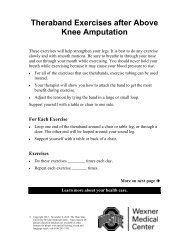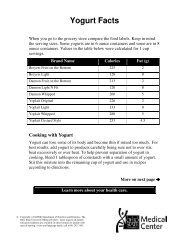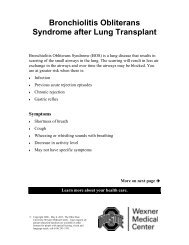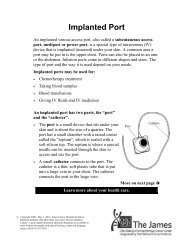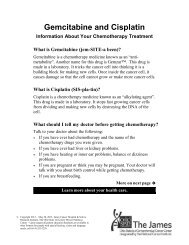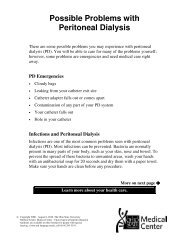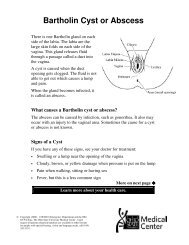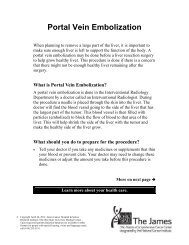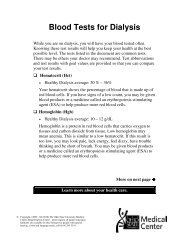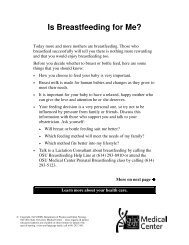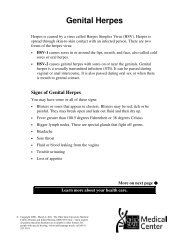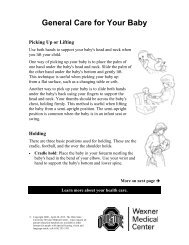Guillain Barre Syndrome (GBS) - Patient Education Home
Guillain Barre Syndrome (GBS) - Patient Education Home
Guillain Barre Syndrome (GBS) - Patient Education Home
Create successful ePaper yourself
Turn your PDF publications into a flip-book with our unique Google optimized e-Paper software.
<strong>Guillain</strong> Barré <strong>Syndrome</strong> (<strong>GBS</strong>)<br />
About <strong>GBS</strong><br />
<strong>GBS</strong> is an autoimmune condition (illness where the body attacks itself) that<br />
can cause arm and leg weakness. With <strong>GBS</strong>, the body reacts by attacking<br />
its own nerves. Nerves become swollen and sore and the coating or<br />
insulation around the nerve (called the myelin sheath) starts to break down.<br />
Without this coating, messages from the brain to the muscles do not get<br />
through. When your muscles do not work, they become weak.<br />
Causes of <strong>GBS</strong><br />
Doctors do not know what causes <strong>GBS</strong>, but it often starts when your body<br />
is fighting another infection. The body works hard to get rid of the<br />
infection and ends up attacking the nerves. Many people, who are sick with<br />
<strong>GBS</strong>, have had a lung or sinus infection or have had diarrhea before signs<br />
of <strong>GBS</strong> start.<br />
Signs of <strong>GBS</strong><br />
Muscle weakness is the most common sign of <strong>GBS</strong>. Weakness often starts<br />
in the legs and can occur on one or both sides of the body. Signs may<br />
include:<br />
• Pain<br />
• Problems closing your eyes<br />
• Problems speaking or<br />
swallowing<br />
© Copyright, (1999 - 10/4/2010) The Ohio State University Medical<br />
Center, Epidemiology - Upon request all patient education handouts<br />
are available in other formats for people with special hearing, vision<br />
and language needs, call (614) 293-3191.<br />
• Neck weakness<br />
• Leg weakness or tingling<br />
• Difficulty holding things<br />
If you are having trouble breathing, call your doctor right away.<br />
Learn more about your health care.<br />
More on next page
Page 2<br />
Testing<br />
To find out if you have <strong>GBS</strong>, your doctor will order certain tests. These<br />
tests may include:<br />
• Electromyogram<br />
• Nerve Conduction Tests<br />
• Blood Tests<br />
• Lumbar Puncture<br />
• Nerve Biopsy<br />
Other neurological tests may be given to check your alertness, muscle<br />
strength, and your ability to feel in your arms and legs. A respiratory<br />
therapist may give you tests to assess the muscles you use to breathe.<br />
Treatment<br />
If the weakness is mild, your condition may get better by itself in 4 to 6<br />
weeks. For others, <strong>GBS</strong> can be severe with lasting nerve damage.<br />
Treatment options may include:<br />
• Medicines.<br />
• Breathing machines, such as ventilator or respirator until muscles used<br />
for breathing are stronger.<br />
• Speech, respiratory, occupational or physical therapy exercises to<br />
improve strength and function.<br />
• Plasma exchanges. Plasma from your body is removed. Red blood cells,<br />
white blood cells and platelets are returned to your body with a fluid<br />
replacement. This can reduce the damage to your body from <strong>GBS</strong> as the<br />
plasma exchange takes out the harmful cells that are attacking the<br />
nerves.<br />
• Immunoglobulin therapy. Proteins are injected into the body that can<br />
help to stop the immune system from attacking the nerves.<br />
It is important to follow your treatment plan. You should actively<br />
participate in your recovery, eat a healthy diet and get enough rest.<br />
Talk to your doctor or others on your health care team if you have<br />
questions. You may request more written information from the<br />
Library for Health Information at (614) 293-3707 or email: healthinfo@osu.edu.


